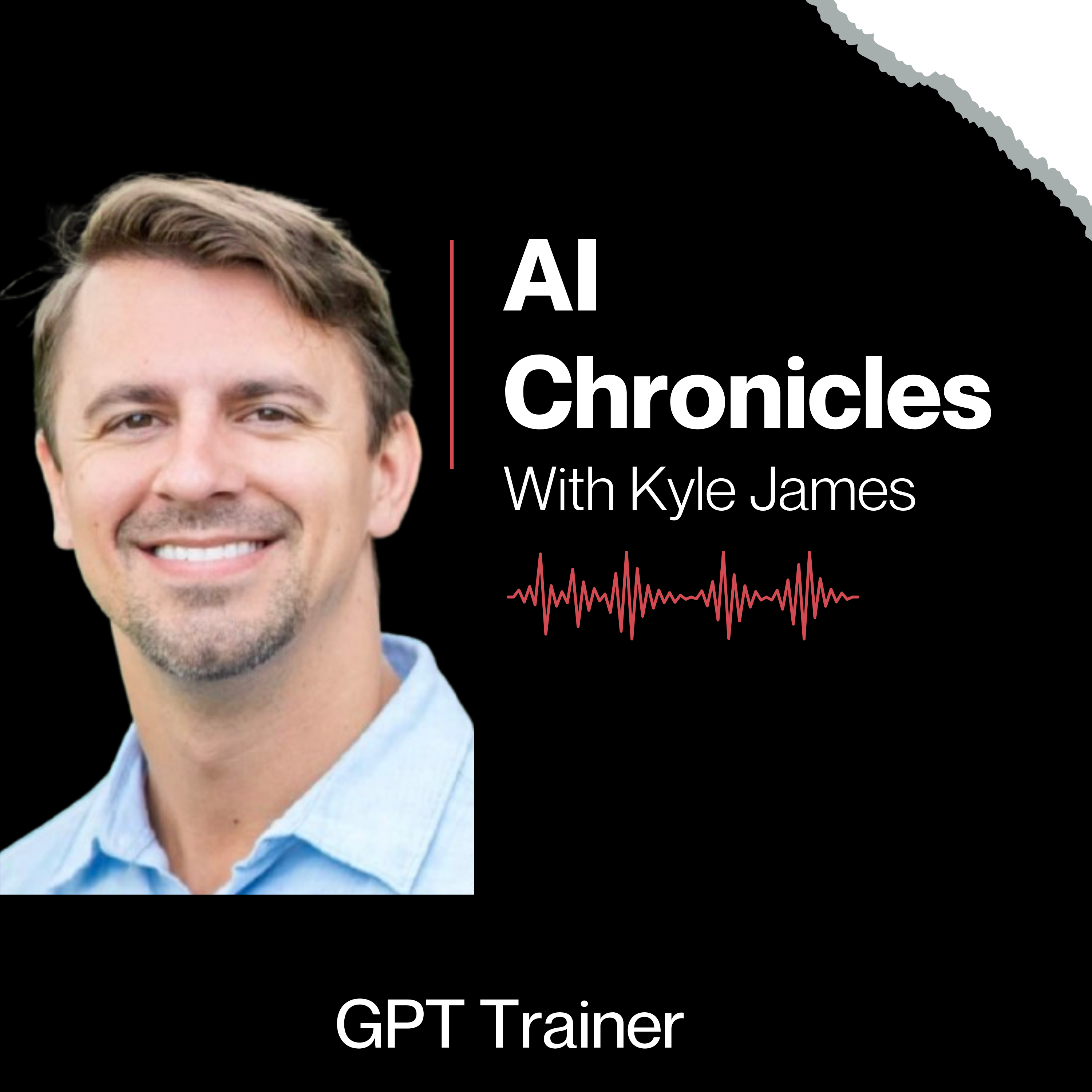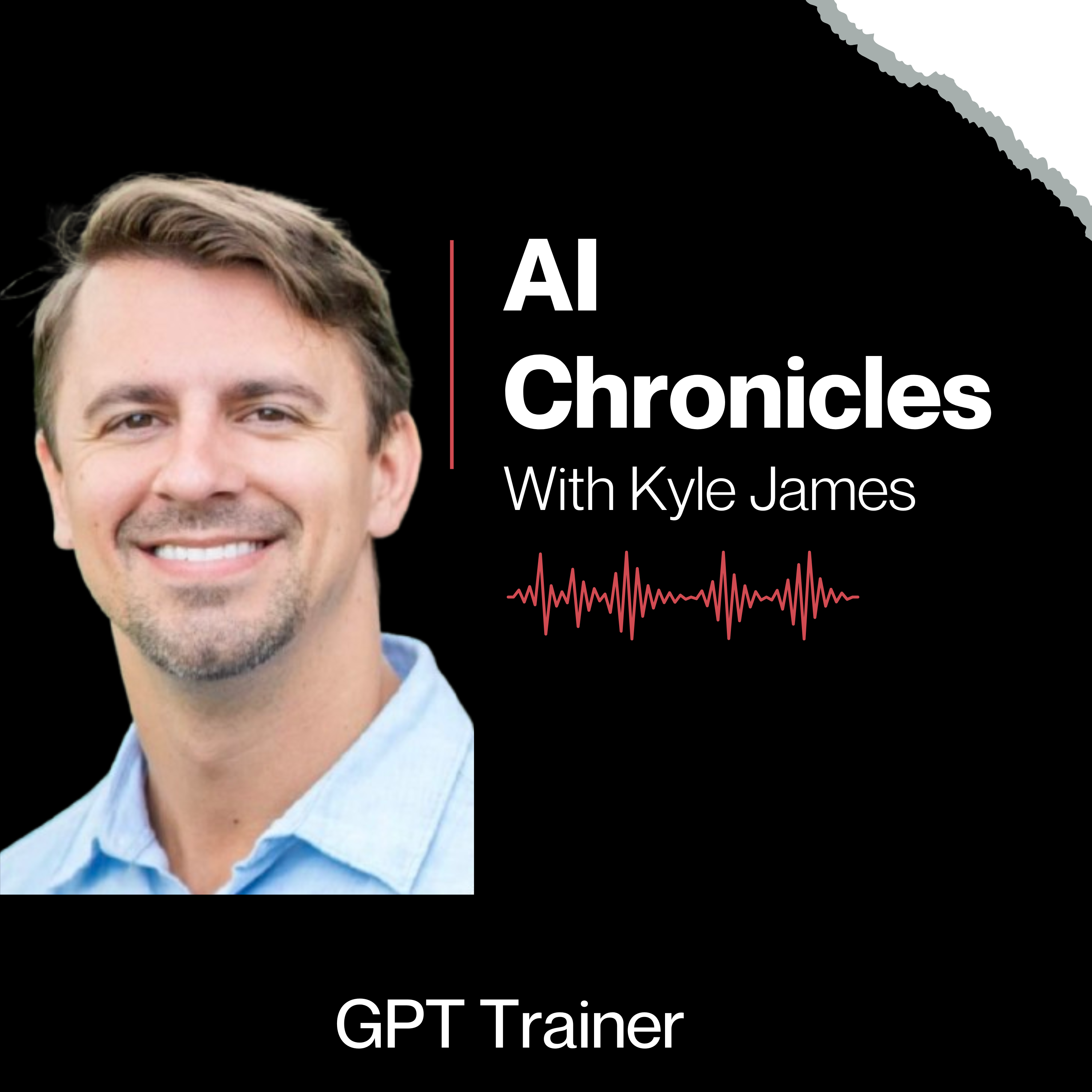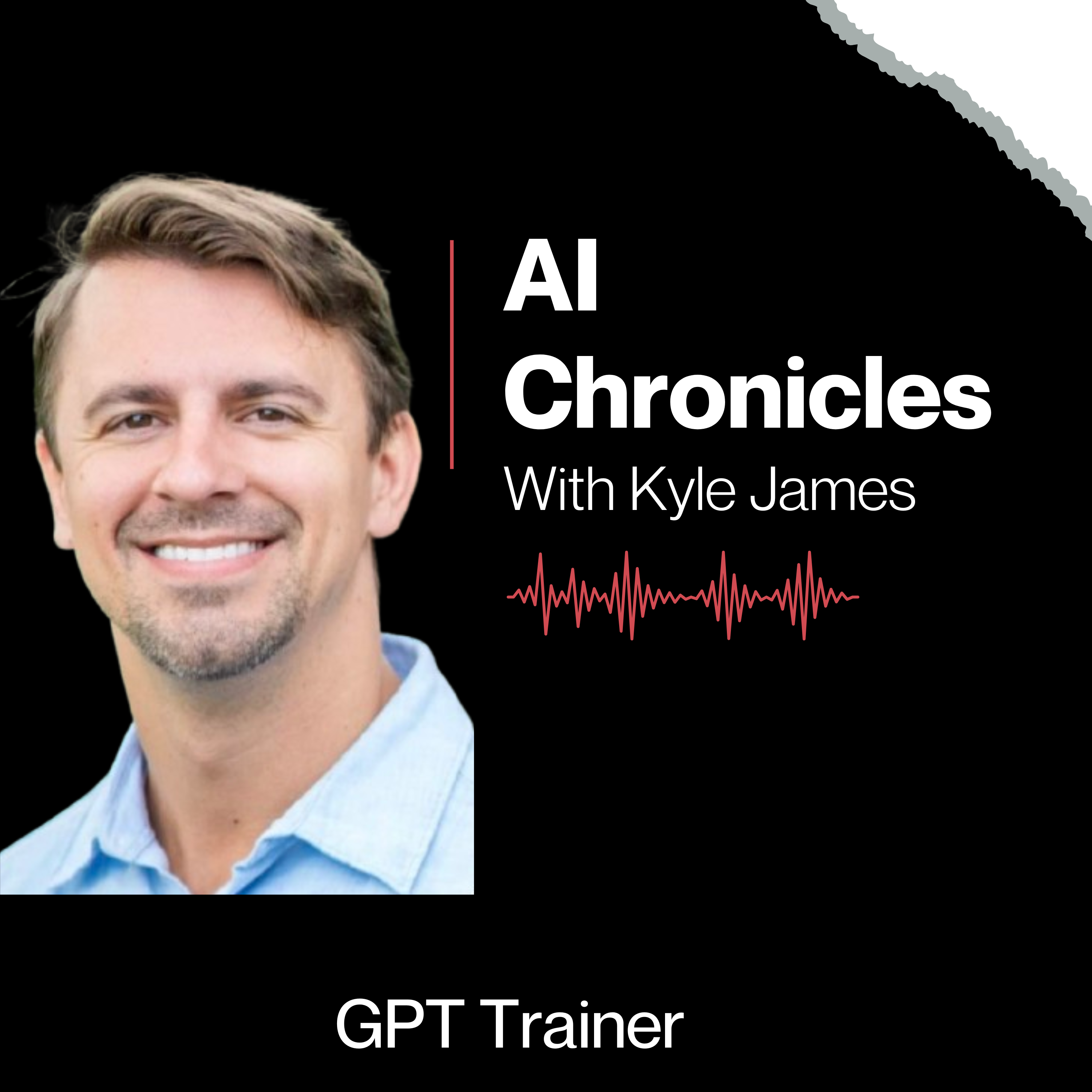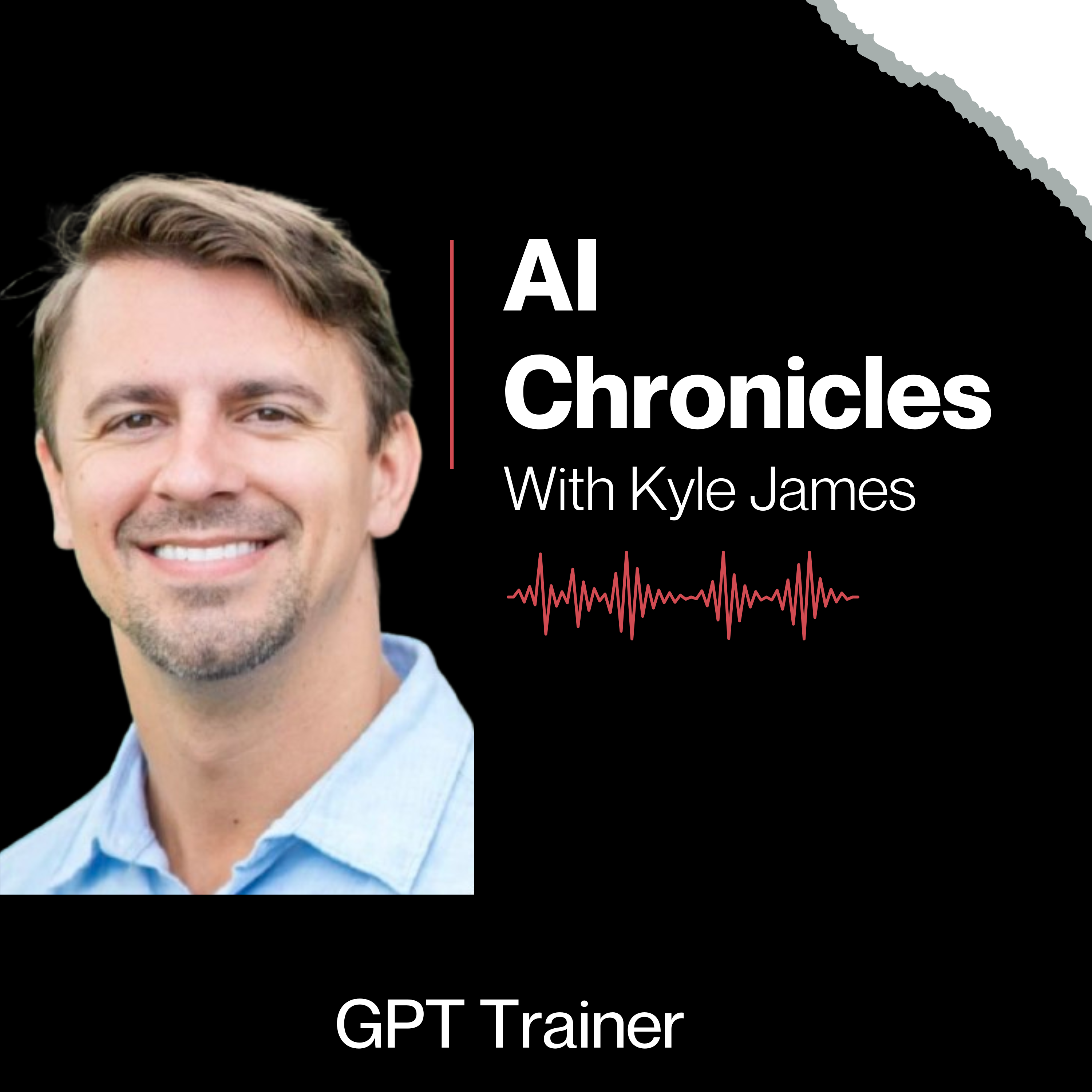Episode Transcript
Kyle James (00:00.942)
Hey, welcome to the AI Chronicles podcast. I'm your host, Kyle James. Today we're going to be discussing how a marketing and SEO analytics company called Moz is using AI inside of their own business. And we'll share the exact steps that you can take in order to implement AI for yourself. Now, before we talk about that, listen closely. Are you looking to implement AI inside of your own company or maybe just struggling to get your AI to stop hallucinating? Speak to GPT Trainer. GPT Trainer literally builds out and manages your AI for you.
eliminating hallucinations for good. Go to gpt-trainer.com. I promise you it'll be the biggest time saving decision that you've made all year. Trying to set up AI on your own is like trying to build a house from scratch. Sure, you could do it, but the time and frustration is going to take you to get it finished. May not be worth it. It's a thousand times faster and safer to hire professionals. Once again, that's gpt-trainer.com. Take it out with me, Jonathan Berthold.
who is the VP of revenue at Moz, Jonathan, who is a seasoned SEO, paid media performance marketer and AI enthusiast. He has over 14 years of experience focusing on driving ROI through conversion rate optimization, product development and creative problem solving. Very excited to have him Jonathan on today on the show. Hey Jonathan, welcome in brother. How are you doing?
Jonathan Berthold (01:21.573)
Doing well. Thank you, Kyle, for the introduction.
Kyle James (01:23.95)
Yeah, man, absolutely. So let's talk about this. I mean, you're at Moz. Like, how did you end up at Moz? Obviously, got an SEO background, a lot of experience. You're in the AI space. Like, walk us through, give us some background a little bit about yourself.
Jonathan Berthold (01:35.665)
Yeah. So I've been in the SEO space. I was here for 14 years and a large part of how I learned how to do SEO back in the day was through Moz. All of their foundational content through their Learn Center, their whiteboard Friday. Basically they were the company to go to to learn about SEO. So, you know, as a long time user, I use their tools for link building. I got into a very fortunate situation where a former colleague of mine ended up working at Moz.
got an opportunity to speak with the GM, got in, and yeah, now I get to work with some very talented individuals in a company that I've admired from afar for well over a decade.
Kyle James (02:17.038)
Yeah, that's amazing. And so you've been, you've been have a little bit of experience at best, best way of saying it and SEO and even an AI. like, wop, wop me through a little bit, maybe on the, on your side and Moz, like what exactly are you using AI for? And like what, when you did start implementing AI, where did you, I guess, like what types of problems or challenges were you trying to solve when you started implementing AI?
Jonathan Berthold (02:39.941)
Yeah, it's interesting because there's two ways we can implement AI. So obviously we're a software company. We deal in the SEO space. AI becomes an important foundational aspect of our actual product. So when it comes to things that we power the data that our customers get, there's obviously some combination of AI involved in the background in terms of how we deliver scores, how we fine tune our algorithms. So on the product side, it's a lot more easier to see because there's an actual
tangible output. But across the rest of the company, we've been experimenting with AI in a lot of different areas from content creation to design, concept builds for videos. We use it a lot for internal analysis for all of our paid media and affiliate marketing stuff. So it's one of those things, I think, from a foundational layer.
we were living and breathing AI due to how we had to build our product to support the demands of the industry right now. But especially with a lot of the systems that have been popping up recently, we found it quite advantageous to start incorporating AI as part of our normal workflows where there's so much untapped potential, I think, using some of the basic LLMs like ChatGPT, Gemini, Clode, and then some of the workflow builders out there that just keep...
getting more impressive in terms of how they automate tasks.
Kyle James (04:06.734)
Yeah, no, 100%. It's definitely, it's definitely changing the way that the, you know, the market is, is, is handling, I would say. And for, from your perspective and, and feel free if you can share some details and if you want to be as detailed as possible, if not, like, walk me through that kind of like the AI step-by-step, like, like what does the process look like either from a client side, like when they come into Moz and what they can use and then maybe even like internally, Hey, here's some of our process and flows that have just really changed the way.
We've done productivity over the last couple of years.
Jonathan Berthold (04:38.289)
Yeah, so from the product side for our customers, especially when they come to Moz, we've thought about the problems that people have in terms of building content workflows, keyword research, understanding how to navigate the world of search. So we've used AI to power quite a few tools, including our keyword suggestions feature in Moz Pro. We help users take a single keyword, then we give them an entire matrix of keyword suggestions and topics.
of clusters they can write about. So, back in the day, would include taking a list of a thousand keywords from Google ads tool. have to sort that manually through Excel. Now we take that manual process out of the way and we serve them, you know, keyword buckets that they can optimize for with search volume search intent, which is also powered by AI. So we take the guesswork out of understanding if, you know, keywords SEOs are targeting our informational transactional commercial.
And we give them ready to use data. So at least on the AI side for customers coming to Moz Pro and using our software, know, saving all that manual time of sorting and cleaning and removing and, know, checking search engine results pages to see what kind of listings show up. All that's gone now and, you know, saving that much time just empowers our users to, to create more content and, you know, spend more time on the things that matter, which is, know, ideation and
conception building and thinking about the type of content that will resonate with their audience. So, know, on the product side, we've done a lot to do that. We've also used AI in terms of how we develop proprietary metrics. know, nowadays with LLMs popping up left, and center, people are looking at things like Google AI mode, AI overviews. have LLM answers through perplexity and chat GPT. You know, we have a proprietary metric called brand authority.
And brand authority is an opportunity for businesses to understand how their brand is seen online in relation to their competitors. How strong of a brand have they built in terms of people actively searching for this brand name? Are they linking, creating content about this brand? And AI helps power that foundational metric.
Kyle James (06:57.208)
Yeah, absolutely. Yeah. mean, AI mode's definitely been a big popular topic lately. you know, it's just, just another thing that shifts, but I think SEO is still going to stay, stay that foundational piece where how do businesses get their business name out and online, just say internet. It doesn't have to be necessarily be Google. It can be just online. People can see and get, get their, get their face out there more. So talk to me a little bit about, maybe some of the results you've been seeing, like for either, for some of the clients you've been like,
Hey, since we worked with Moz, it's the traction we got, maybe something to highlight or maybe even internally from your team, you know, results wise, that's something that's worth sharing.
Jonathan Berthold (07:35.887)
Yeah, I think on the internal side, know, we've used, we have our own API that powers a lot of our data solutions. you know, when we talk to customers, especially on the enterprise side, you know, when you talk about an API product for them, it's hard to conceptualize. So we ended up using AI to build kind of a basic web tool where clients can plug in their API key. They can get the data instantly based on any search that they want. But internally it saved our team a lot of time in terms of data analysis.
you know, one good example was, we, built up our own tool using AI that allows us to get the search intent for every single keyword we've bid on from a paid search perspective, allowing us to understand, you know, what's our cost per acquisition per type of intent. Obviously if it's more informational, higher CPA, how can we address this with more maybe informational content or advertorials where it is more navigational, you know, what's our CPA look like for branded terms?
We built these internal tools to help us better analyze obviously paid media traffic and then using AI to better understand our content clusters for our website. for your listeners, for anyone who goes to moss.com, we have a ton of content, a ton of content, a lot of which can be found over the past decade. There's even some older articles out there and we've been using AI to help us better understand what's the sentiment analysis of this content.
There are semantic similarity to other content clusters as they're overlapping or things like that. Typically, it would be a very manual and arduous process. We've been able to speed up and cut 80 % of the time of trying to do all that manual sorting analysis. obviously, customer-facing product, customers can see the benefits from what they use in our tool. But on the internal side, especially for our marketing teams, we've been using AI in a lot of creative ways to help just
get better at what we do, whether it's paid search or SEO.
Kyle James (09:34.734)
Yeah, for sure. What was it? don't know how long Moz has been and like using some of the AI tools, but like, what was that like? And it might be before your time too. So feel free to bypass this question, but like, what was that like for the team initially, like when they didn't have really any AI tools or maybe they weren't utilizing them. then that transition period where it's like, okay, hey, we are going to start adding AI. Um, you know, what would some of those maybe highlight changes like, wow, this, this was like a Eureka moment when we did add AI that changed the way our workflow was.
Jonathan Berthold (10:05.189)
Yeah, I think, you know, I joined Moz last year when we had launched a few of our products that incorporated AI and we had a huge push around, you know, Discover Moz. We now have AI powered capabilities. And I think since I've been here over the last year, we've just been seeing data get better. The output get better for our users. Our customers are finding our solutions very useful. We're seeing happier customers. I think from a stickiness perspective.
AI has helped us build a better product overall. A lot of the guesswork's taken out, or lot of the questionable things that you see in SaaS platforms have been gone. I think it's hard to explain how they viewed it before I came along. I think people have totally embraced using AI in our workflows, and have seen that tangible increase in the product that we deliver. And it's something that, if you look at the SEO space in general,
Even just a few years ago, there were a couple of micro tools that used AI and now they're all exploding either in terms of growth for specific businesses. know, Surfer is a good example of one that has AI content generation using AI. And then you have just a litany of new tools that are now focusing on LLM visibility and AI visibility as well.
Kyle James (11:23.15)
Yeah, for sure. And walking through the next couple of years, where do you see maybe Moz taking a big step in the AI space? then where do you see it maybe find the biggest role in your team's operation next?
Jonathan Berthold (11:37.999)
Yeah. So for us, it's all going to be about the evolution of search. Traditionally for the last 10, even 15 years, has been pretty stagnant. It's all been about rank tracking on search engines, predominantly rank tracking on Google and how many links you're generating. Now we're getting into the AI world where users are looking for answers on chat GPT, complexity, any type of LLM that they can use. AI mode, again, that presents a real shift.
the typical search engine result page where instead of getting 10 blue links, you're now getting a summarized article essentially of all the recommendations that Google deems worthy, customized for you. So what we're doing over the next few years and especially now is building these tools to help our users understand how their brand is being mentioned through all of these LLM summaries, what kind of citations, what kind of content they've created that is getting cited amongst all these different
AI tools, so 100 % going all in on AI visibility. And it just doesn't stop there from a marketing perspective. We're building up tools, and we have actually launched quite a few this year that are focused around AI for local marketing. Thinking about optimizing your presence for plumbers, for dentists. They use Google as an opportunity to show their business listing. And we've incorporated AI.
Kyle James (13:00.59)
you
Jonathan Berthold (13:06.241)
as additional features to help them automate listings management, automate review management. So if I had to say in one line what Moz's feature is going to look like, we're pretty much all in on AI and really updating our feature set to not just deliver AI-based features, but also give brands, both small and enterprise, the opportunity to see how their website and their brand specifically is mentioned on these LLMs.
Kyle James (13:32.46)
Yeah. Yeah. That's a big, that's a big topic, right? That this, kind of like you mentioned the AI mode where instead of having those 10 blue links, it's, it's now going to be people asking the LLM. Have you been getting a lot of like, I guess, like maybe questions about like, Hey, how is this, how is this going to change things? Like more people are using AI. not going, they're not clicking like clicks are going down. And obviously Google is trying to balance it out as well. Like, like, what do you foresee like actually happening over the next like three years or two years or five, even 10 of like.
Is it all going to switch over to AI? they still going have like, what's kind of like your personal perspective on that? But you would say Jonathan.
Jonathan Berthold (14:07.695)
Yeah. My personal perspective on that is I think we're going to start seeing the first decentralization of search. know, especially in the United States and North America particularly, but also in Europe, Google's always going to be the top one. Google's always the top engine. People are used to that perspective. Millennials now have grown up knowing how to Google, right? Basically as lexicon in terms of how they grew up. Now we're getting a new age of users who...
They digest information through a variety of channels, obviously TikTok, YouTube, Reel, Snapchat. That's how they grew up. They're more inclined to test new features, new product sets. And we're starting to see people rely on ChatGPT, on LLMs. And now with AI mode coming out from Google, I think they're really going to go strong in serving that as not just an alternative, but potentially the primary endpoint for users to kind of digest information.
I see Google going pretty much all in on that, for the most part, personally. And from a CERT perspective, they'll figure out ways to monetize it. But I think the way that we see search as it exists right now is going to be radically different in three years, especially as these LLMs get smarter and some of them perplexity creating their new browser. So I think we're going to start seeing a little bit more competition from a browser perspective, which will definitely impact how people search online.
Kyle James (15:28.078)
Hmm.
Yeah, that's I love that. I love that perspective and I appreciate you sharing that. I it's very valuable for everyone listening in today and for you if you don't mind maybe share like where can people learn a little bit more about you Jonathan and maybe a little bit more about Moz that you would recommend them maybe check out.
Jonathan Berthold (15:44.901)
Yeah. Yeah, so it's definitely moz.com. We have a website full of information on SEO, including our academy, where users can kind of get the most up-to-date knowledge on SEO and find out how they can apply it themselves for their own websites. So definitely that's a good starting point to learn more about Moz. And you'll see that we also have an enterprise rank tracking product, Stat, which is part of our company as well. So that's a good foundational point for Moz.
For myself, I do write for the Moz blog on occasion as well. Users can also check me out on LinkedIn where I post a lot of content related to SEO, both local and in the industry in general. And then also I'm very active on Twitter. Yes, I still call that Twitter. It's stuck in my brain like that. Where I do have hot takes about marketing and then hawking some other topics in general. But Moz.com is a good place to start for all that.
Kyle James (16:39.586)
Awesome. Love it. Thank you so much. Jonathan is great. Having on the show today, brother. We'll definitely, let's keep in touch and looking forward to hopefully see on another episode in the near future. And, for those listening in, remember if you're looking to implement AI into your business today, please don't try and do it yourself. The time is just the AI could cause it may not be worth it. So schedule a call with GPT trainer and let them build out and manage your AI for you. Once again, that's GPT dash trainer.com signing off for now.
Have a great rest of your day everybody and looking forward to seeing everyone on the next episode of AI Chronicles.



